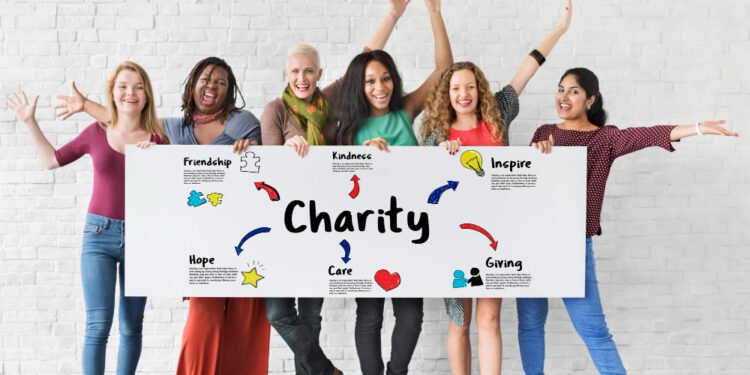What if giving could make you happier than getting? Philanthropy, or giving to charity, is a powerful way to help others. It’s not just about money. It’s about helping out, volunteering, and using your skills to make a difference.
Today, more people are giving in new ways. It’s important to know how your gifts truly help. This way, you can make a bigger impact.
When we give, we often don’t think about how it makes us feel. But, studies show that giving on purpose makes us happier. About 60% of givers say they give because it matches their values and passions. This shows how important giving is for helping our communities.
Key Takeaways
- Philanthropy is not just about donating money, but also about community service and volunteering your time.
- Individuals who give with intention report feeling a higher sense of satisfaction and fulfillment from their charitable contributions.
- Approximately 60% of givers cite alignment with personal values and passions as a primary motivation for their giving.
- Engagement in local philanthropy initiatives can strengthen community connections and enhance emotional fulfillment.
- Effective philanthropy seeks to address systemic social issues, not just provide immediate relief.
- Donations to charitable organizations can include time, skills, and other resources, showing the many ways to give.
Understanding Modern Philanthropy in Today’s World
Philanthropy is key in our society today. Many people and groups work together to make a difference. It shows us the power of kindness and helping others.
Nonprofit groups help lead the way in giving back. They teach us about caring for others and our community.
The Evolution of Charitable Giving
More people are giving back every year. Donor-advised funds make it easy to help out, even with small amounts. This has made giving more common and meaningful.
Key Components of Effective Philanthropy
Good giving is about planning and making a real difference. Many focus on giving that also helps the planet or people. This approach attracts more people to help out.
The Role of Technology in Modern Giving
Technology has changed how we give. It helps groups spread their message and collect funds online. New ways like buying things that help charities are also popular. Together, we’re making a big impact.
Why Philanthropic Initiatives Matter for Social Change
Philanthropic efforts are key in pushing for social change. They offer support and resources to those who need it most. By organizing fundraising campaigns, people can help raise money and awareness for important causes.
Volunteering is another way to make a difference. It allows individuals to use their skills and time to help others. This direct action can change lives for the better.
Philanthropy has a big impact on society. It helps meet immediate needs and also shapes public policies. By backing organizations that fight for justice, donors can help bring about lasting change.
Donations are essential for tackling big issues like poverty, environmental problems, and access to healthcare. Sometimes, government funding isn’t enough, and that’s where philanthropy steps in.
There are many examples of successful philanthropy. The civil rights movement in the U.S. and groups like the New Virginia Majority show its power. These efforts highlight the value of working together for a better society.
By getting involved in volunteer work and supporting fundraising efforts, we can all help make a difference. Together, we can work towards a fairer and more just world.
Getting Started with Charitable Giving
When you think about giving to charity, start by figuring out what you want to achieve. Pick causes that match your values. This way, you make choices that feel right and bring you joy.
Knowing the different ways to donate is key. For example, giving stocks or assets can help both you and the charity. Also, giving without restrictions lets charities use the money where it’s most needed. This way, you can really make a difference in your community.
Aligning Donations with Personal Values
About 70% of wealthy people decide to give based on their values. This shows how important it is to match your donations with your beliefs. Doing this can leave a lasting mark and encourage others to help too.
Every bit counts, whether it’s through volunteering or donating. Together, we can bring about big changes for the better.
Strategic Approaches to Philanthropy
Companies can make giving back a key part of their values and mission. This boosts their social responsibility and reputation. By creating a culture of giving, they attract the best talent and motivate their employees.
This approach greatly improves employee morale, engagement, and loyalty. Employees feel proud to work for a company that cares about giving back. They are more motivated and committed to their work.
Strategic philanthropy helps businesses use tax-deductible opportunities to give more to the community. Focusing on a few non-profits can lead to deeper, more meaningful partnerships. Employee-led initiatives and cause marketing also boost employee satisfaction and raise funds for important causes.
Investing in the community through philanthropy builds goodwill and support for business. Companies that focus on social responsibility outperform others. With many millennials valuing companies that give back, strategic philanthropy is key to attracting and keeping top talent.
Maximizing the Impact of Your Charitable Donations
Charitable giving is a powerful way to create positive change in the world. With millions of nonprofit organizations to choose from, it’s essential to make informed decisions when donating. In 2023, Americans donated $557.16 billion, according to the Lilly Family School of Philanthropy.
To maximize the impact of your charitable donations, it’s important to choose organizations that match your values and goals. This means doing your research, understanding their financial transparency, and measuring their social return on investment. By doing this, you can ensure your donations make a real difference in people’s lives.
Due Diligence in Selecting Organizations
When choosing a nonprofit to support, research their mission, values, and financial transparency. Look for organizations that clearly share their programs, services, and impact. This helps you make a smart choice about where to donate your time and resources.
Understanding Financial Transparency
Financial transparency is key in charitable giving. Look for nonprofits that share detailed financial information, like their annual budget, expenses, and revenue. This lets you see how your donation will be used and ensures it’s used effectively.
Measuring Social Return on Investment
Measuring the social return on investment (SROI) of your donations is vital. SROI shows the social benefits of a donation compared to its cost. By using SROI, you can find out which nonprofits are making the biggest difference. Supporting these organizations through charitable giving can help create lasting change and positively impact the world.
Building Lasting Relationships with Nonprofit Organizations
Nonprofit groups need donations to keep going. They focus on making strong bonds with their supporters to get more money. Helping out and volunteering are key to building these connections.
Studies show that donors who really get involved give more money over time. They might even become yearly supporters. This shows how important it is to build lasting ties with these groups.
About 75% of involved donors share their support with others. This shows how important it is to focus on building relationships. It also makes people more likely to help out and volunteer.
By focusing on building relationships, nonprofits can get more money and keep donors. Talking about how their efforts make a difference can keep donors coming back. Giving people chances to volunteer and help out builds trust and strong partnerships.
The Role of Corporate Social Responsibility in Philanthropy
Corporate social responsibility (CSR) is key in philanthropy. Companies are now expected to help society. They do this through various ways, like teaming up with charities and encouraging employee donations.
By adding philanthropy to their mission, companies can positively affect society. This also boosts their reputation and gains customer trust and loyalty.
Business-Charity Partnerships
Business-charity partnerships are a big part of CSR. They let companies support causes they believe in while promoting their brand. Many companies now run fundraising campaigns for social causes.
For example, Medtronic and GE have focused on reducing deaths from noncommunicable diseases and making healthcare affordable. This shows their dedication to giving back.
Creating Sustainable Impact
To make a lasting difference, companies must focus on being socially responsible. This includes fair labor and eco-friendly operations. They can do this through employee volunteering and community involvement.
This approach not only improves their image but also boosts employee morale. It also helps society’s well-being. As people become more aware of social issues, companies that support these causes attract loyal customers and top talent.
Innovative Ways to Support Causes You Care About
Philanthropy is more than just giving money. It’s about making a real difference in the world. Today, people are finding new ways to help, like using digital platforms, micro-philanthropy, and volunteering with their skills. These methods help individuals make a big impact in their communities through charitable donations and community service.
Digital Fundraising Platforms
Digital fundraising has changed how we donate to charities. It makes giving easy and convenient. For example, online campaigns can spread fast on social media, reaching many people and encouraging them to give to charitable donations.
Micro-Philanthropy Opportunities
Micro-philanthropy is becoming more popular too. It’s about giving small amounts often to help a cause. This way, even small donations can add up to make a big difference. By doing micro-philanthropy, people can help their communities and contribute to positive change.
Skills-Based Volunteering
Skills-based volunteering is another creative way to help. It means using your skills to help organizations, not just money. This way, you can have a bigger impact and help with charitable donations and community service efforts.
Legal and Tax Considerations for Charitable Giving
When you give to charity, knowing the legal and tax rules is key. Donors can write off cash donations on Schedule A. But, you can only deduct up to 60 percent of your income. Some donations, though, let you deduct up to 100 percent of your income.
Nonprofits are vital in charity work. Donors need to know how their gifts affect their taxes. Companies can write off donations up to 25 percent of their income. Some groups, like private foundations, have their own rules for deductions.
For help with tax laws, talk to a tax expert or financial advisor. Knowing the tax side of giving helps make your donations go further. This way, you help your favorite charities and save on taxes too.
Every day, U.S. families and individuals give over $1 billion to charity. Using tax strategies like donations to 501(c)(3) charities can lower your taxes. As charity grows, staying up-to-date with tax and legal rules is important.
Conclusion: Embracing Your Role in Creating Positive Change
Philanthropy is a powerful force for good. It can change lives, strengthen communities, and drive positive change worldwide. By embracing your role as a philanthropist, you can help create a brighter, more compassionate future for everyone.
Whether you’re a business leader or an individual, there are many ways to get involved. Studies show that philanthropic initiatives can boost employee engagement and improve brand reputation. They can even increase customer loyalty by up to 82%.
By aligning your giving with your values and choosing the right nonprofit partners, you can make a bigger impact. Digital fundraising platforms and micro-philanthropy opportunities make it easier to support the causes you care about.
Remember, your actions, no matter how small, can make a big difference. So, embrace your role as a philanthropist and help create a brighter future for all.
FAQ
What is the significance of philanthropy in today’s world?
Philanthropy is more than just giving money. It’s about making a difference in society. It brings people together and creates a sense of community. It shows that kindness knows no bounds.
How can I get started with charitable giving?
To start giving, first figure out what you want to achieve. Then, pick causes that match your values. Knowing your options helps you find the right way to give. Giving in a way that feels true to you makes it more rewarding.
What are the benefits of strategic philanthropy for businesses?
Philanthropy attracts great talent and boosts employee morale. It makes your company stand out and builds trust with customers. It’s a win-win for both your business and society.
How can I maximize the impact of my charitable donations?
To make a bigger difference, choose organizations wisely. Look at their financial health and how they use donations. Giving shows the power of generosity, not just wealth.
How can I get involved with nonprofit organizations beyond just donating?
Getting to know the nonprofits you support is key. You can volunteer or help in other ways. Every skill helps, so find a way to contribute.
What legal and tax considerations should I keep in mind for charitable giving?
Understanding tax laws helps you give more effectively. It ensures your donations are tax-smart. Knowing the nonprofits you support makes giving more personal and rewarding.





